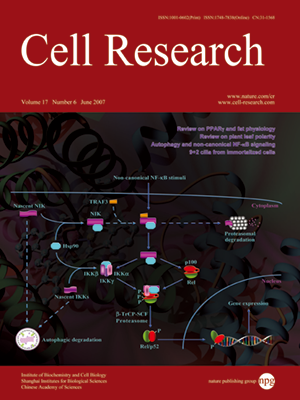
Volume 17, No 6, Jun 2007
ISSN: 1001-0602
EISSN: 1748-7838 2018
impact factor 17.848*
(Clarivate Analytics, 2019)
Volume 17 Issue 6, June 2007: 520-530
ORIGINAL ARTICLES
Hsp90 regulates processing of NF-κB2 p100 involving protection of NF-κB-inducing kinase (NIK) from autophagy-mediated degradation
Guoliang Qing, Pengrong Yan, Zhaoxia Qu, Hudan Liu and Gutian Xiao
Department of Cell Biology and Neuroscience, Rutgers, The State University of New Jersey, Piscataway, NJ 08854, USA
Correspondence: Gutian Xiao(xiao@biology.rutgers.edu)
NF-κB-inducing kinase (NIK) is required for NF-κB activation based on the processing of NF-κB2 p100. Here we report a novel mechanism of NIK regulation involving the chaperone 90 kDa heat shock protein (Hsp90) and autophagy. Functional inhibition of Hsp90 by the anti-tumor agent geldanamycin (GA) efficiently disrupts its interaction with NIK, resulting in NIK degradation and subsequent blockage of p100 processing. Surprisingly, GA-induced NIK degradation is mediated by autophagy, but largely independent of the ubiquitin-proteasome system. Hsp90 seems to be specifically involved in the folding/stabilization of NIK protein, because GA inhibition does not affect NIK mRNA transcription and translation. Furthermore, Hsp90 is not required for NIK-mediated recruitment of α the subunit of IκB kinase to p100, a key step in induction of p100 processing. These findings define an alternative mechanism for Hsp90 client degradation and identify a novel function of autophagy in NF-κB regulation. These findings also suggest a new therapeutic strategy for diseases associated with p100 processing.
Cell Research (2007) 17:520-530. doi: 10.1038/cr.2007.47; published online 12 June 2007
FULL TEXT | PDF
Browse 1968


